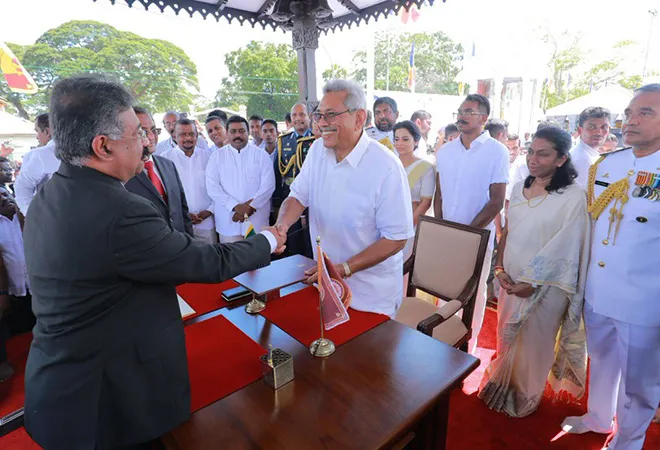-
CENTRES
Progammes & Centres
Location
A closer look at what Sri Lanka’s recent election results may mean for ties between New Delhi and Colombo.

The November 18 swearing in of Gotabaya Rajapaksa as the new president has brought the Rajapaksa family back into the political limelight in Sri Lanka. It has also spotlighted some of the potential security implications of their return to power.
As the defense secretary from November 2005 to January 2015, Rajapaksa was seen as a strong leader who put an end to the nearly 30-year-old civil war in the country. Once in office, Rajapaksa promptly chose his elder brother Mahinda Rajapaksa, former two-term president himself, as his prime minister.
The return of the two Rajapaksas in the recent polls is not surprising against the backdrop of the bombings in Sri Lanka in April, which killed more than 250 people and injured more than 500. The Easter bombings in churches and luxury hotels in Colombo and elsewhere brought back fears of terrorism taking roots again in the island nation. The Easter bombings also brought a fresh wave of Sinhala nationalism and Islamophobia, which was evident in the recent elections.
India, the neighboring regional great power, is likely to be worried because the Rajapaksas are seen as being sympathetic to China. However, the new president has made repeated statements that his government would like Sri Lanka to be a “neutral country” and that “Sri Lanka won’t do anything that will harm India’s interests.” Gotabaya was also critical of the previous government giving Hambantota Port on a 99-year lease to China and said, “We have to renegotiate.” He went on to add that giving land as investment for developing a hotel or a commercial property was not a problem but “the strategically important, economically important harbor, giving that is not acceptable.”
While this rhetoric may be read as reassuring to some, it is too early to say with certainty how Gotabaya will balance India and China. As is the customary practice, the president will travel to New Delhi on November 29, making India his first foreign visit after assuming office. India has also been proactive on Sri Lanka, with India’s External Affairs Minister Dr. S. Jaishankar being sent to meet with Gotabaya, with a personal invitation from Prime Minister Narendra Modi to visit India.
The anxieties about the Rajapaksas come from how their past behavior toward China is perceived in New Delhi, and they will not be easily quelled. Despite his current criticism of the Hambantota deal, Mahinda was the one who initiated the deal for developing Hambantota port in 2017 when he was president. The port also happens to be in his parliamentary constituency. While it should be noted that the port development offer was initially made to India and then handed to China, that has not affected the extent of Indian concern. Chinese nuclear submarines also made port visits to Colombo port in 2014, which caused great consternation in India.
More broadly, China’s deep pockets are evident in the number of economic and infrastructure projects in Sri Lanka, including investments in the Colombo International Financial Center, Colombo-Kandy highway, oil refineries, and a $1.4 billion port city next to the Colombo port. India has its own list of pending Sri Lankan development projects that it wants to be part of, including an LNG terminal in Kerawalapitiya near Colombo, a 50-100 MW solar power plant and development of an oil tank farm in the eastern district Trincomalee and the East Container Terminal at the Colombo port.
These concerns notwithstanding, there clearly has been an effort by both India and Sri Lanka to patch up their ties. After Mahinda’s defeat in the 2015 elections, Modi visited Sri Lanka in 2015, 2017, and June 2019, and, each time, Modi made it a point to meet Mahinda. Similarly, Modi also met him in September 2018 when Mahinda and his son visited India. On the Rajapaksas’ side too, there appears to be earnest interest in improving relations, at the very least due to the fact that Mahinda wants to create the perception that he is moving away from an earlier China tilt to equidistance between India and China.
But beyond what Sri Lanka does, India will also need to do its part as well. Rather than focusing on building the case against China, New Delhi must step up its efforts to show what it is for. India can never match Beijing’s economic wherewithal to make a difference to Colombo’s developmental requirements. But it can carve out a niche role in some areas and also partner smartly with likeminded strategic partners like Japan to make an economic and strategic difference in Sri Lanka.
This commentary originally appeared in The Diplomat.
The views expressed above belong to the author(s). ORF research and analyses now available on Telegram! Click here to access our curated content — blogs, longforms and interviews.

Dr Rajeswari (Raji) Pillai Rajagopalan was the Director of the Centre for Security, Strategy and Technology (CSST) at the Observer Research Foundation, New Delhi. Dr ...
Read More +